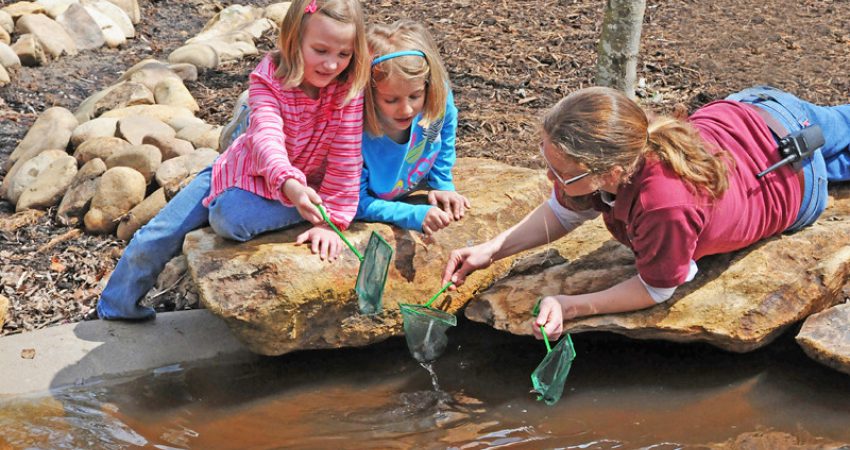
By Melissa Ballard - November 2015
PAPER CITATION
Wallace, C. S., & Brooks, L. (2015). Learning to teach elementary science in an experiential, informal context: Culture, learning, and identity. Science Education, 99(1), 174–198. doi:10.1002/sce.21138
Preservice teachers who complete their field placements in a traditional classroom setting may often encounter constraints to practicing their science teaching methods such as a limited time for science, an emphasis on testing, and a pressure to teach science in traditional ways. In this paper, Wallace and Brooks study an elementary science education methods course where the field placement occurred in a summer camp—an informal and experiential learning environment. The authors first sought to characterize the culture of the methods course. They then looked at how the existing personal and professional identities of the preservice teachers influenced what they learned from the course and how the course culture, in turn, influenced their professional identity development. In this paper, professional identity refers to educators’ interest in and desire to teach science. Previous research has demonstrated the importance of professional identity for elementary school teachers.
Research Design
A total of 18 education students were enrolled in the five-week summer elementary science education methods course at a four-year elementary education program at a medium-sized university in the Midwest. A subset of 12 students participated in the study, and three (two white females and one white male) volunteered for the case study.
The first half of the course was spent learning the basics of teaching science. During the second half, the students served as teachers and counselors in a summer science camp for children. Three experienced certified teachers supervised the camp sessions and mentored preservice teachers. However, the pre-service teachers were given great autonomy to plan and teach camp activities, including playing the role of camp counselor supervising children during times outside of structured learning.
Using ethnographic methods, Wallace and Brooks observed both the lecture portion of the course and the field placement. They also conducted group and individual interviews and collected students’ lesson plans and written reflections.
Research Findings
Three themes emerged as central to the culture of the methods course and field placement in the summer camp, which differed from the average experience of preservice teachers completing their field placements in traditional classroom settings:
- Personal autonomy. As summer camp instructors, the preservice teachers were collectively responsible for all aspects of instruction including lesson planning and materials management. They also took care of non-academic experiences like icebreakers, transitions, and snack time. The preservice teachers felt empowered by this autonomy.
- Peer collaboration. In co-planning and co-teaching activities, the preservice teachers observed their peers teaching, offered and received feedback on lesson plans and teaching performance, and focused on their own teaching practices while their team members attended to behavior management.
- Close relationships with children. Preservice teachers were able to work closely one-on-one and with small groups of children, primarily because the co-teachers who were not leading the activity sat with the children. They developed a strong understanding of how particular children were learning and what they were struggling with. Several of the preservice teachers gained experience in working with diverse learners, including English language learners and one hearing-impaired child.
The study found that the individual identity development of the preservice teachers correlated to their baseline professional identity, learning experiences, and relationship to science. For example, one teacher, Allan, initially had a positive disposition towards constructivist principles, partially because of his experiences as a learner with ADHD. Although Allen needed to improve his techniques, there were clear synergies between his emerging identity and what he was learning about inquiry-based teaching. Another teacher, Kelly, came in feeling ambivalent toward science and teaching. She had little confidence in her own science knowledge and lacked clarity on how children learn. Throughout the course, she was greatly influenced by the ideas and teaching practices of peers who had a stronger understanding of inquiry-based, hands-on approaches.
Theoretical Basis
This study is grounded in situated learning theory, which understands learning as social activity that develops in particular activities, contexts, and cultures. Wallace and Brooks draw on Brown, Collins, and Duguid’s (1989) description of situated learning, which contends that, through imitation and social interactions, people absorb the behaviors and belief systems of their cultural environment. Thus, for preservice teachers learning to teach elementary science, the particular cultural environment in which they are embedded – such as an informal summer camp – will influence their professional knowledge, practices, and identity formation.
Implications for Practice
This paper suggests that informal settings may provide more flexible contexts for such pre-service development. Giving new educators professional autonomy and allowing them to work collaboratively can contribute to a supportive environment where educators can interrogate and practice their science pedagogy and teaching methods. Additionally, this paper shows that the initial identities of educators help determine what trajectory their identity development takes, suggesting that informal science professional development providers might probe trainees’ ideas about and experiences with science and learning to understand how to support development of a positive professional identity.
References
Brown, J. S., Collins, A., & Duguid, P. (1989) Situated cognition and the culture of learning. Educational Researcher, 18(1), 31–42.




